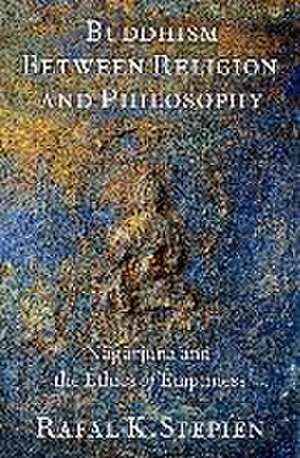Buddhism Between Religion and Philosophy: Nāgārjuna and the Ethics of Emptiness
Autor Rafal K. Stepienen Limba Engleză Hardback – 29 aug 2024
Preț: 492.56 lei
Preț vechi: 675.66 lei
-27% Nou
Puncte Express: 739
Preț estimativ în valută:
94.25€ • 102.70$ • 79.42£
94.25€ • 102.70$ • 79.42£
Carte disponibilă
Livrare economică 22-28 martie
Livrare express 19-25 martie pentru 124.37 lei
Preluare comenzi: 021 569.72.76
Specificații
ISBN-13: 9780197771303
ISBN-10: 0197771300
Pagini: 416
Dimensiuni: 130 x 231 x 38 mm
Greutate: 0.86 kg
Editura: Oxford University Press
Colecția OUP USA
Locul publicării:New York, United States
ISBN-10: 0197771300
Pagini: 416
Dimensiuni: 130 x 231 x 38 mm
Greutate: 0.86 kg
Editura: Oxford University Press
Colecția OUP USA
Locul publicării:New York, United States
Recenzii
Stepien presents a detailed, clearly argued critique of much of the contemporary Western intellectual engagement with Nāgārjuna and describes how Nāgārjuna's Madhyamaka can be understood as the source of an approach that is simultaneously religious, philosophical, and ethical in nature. Scholars working on the historical, religious, and philosophical aspects of Nāgārjuna's works have much to gain from engaging closely with Stepien's arguments.
Nāgārjuna's Fundamental Verses on the Middle Way is often read as a purely metaphysical exploration of emptiness, or, if more than this, purely soteriological. Rafal Stepien argues that this is a misreading-that Nāgārjuna's project is not only metaphysical and soteriological, but also ethical, adding nuance to our understanding of the Buddhist ethical project and of Madhyamaka philosophy.
Stepien extricates Nāgārjuna from narrow philosophical doldrums and, impressively, foregrounds the ethical significance of this incomparable thinker. Students of Buddhist philosophy will find much benefit in such a reading.
Legend has it that Nāgārjuna descended to the bottom of the ocean in order to bring back the founding texts of his provocative tradition. Rafal Stepien has descended into the restless ocean of contemporary interpretations rising around Nāgārjuna's works and returned with provocations of his own, asking whether our ways of making sense of Nāgārjuna do justice to his texts and the textures of his thought. Stepien conjures for us one more Nāgārjuna, one whose arguments deserve engagement, whose words just might change your mind.
This book is an attempt to correct that Eurocentric approach. It reconsiders contemporary philosophical views on Nagarjuna's writings from a more holistic standpoint, and attempts to avoid imposing western philosophical ideals on topics such as the tetralemma, emptiness, and ethics. While this book ought to be required reading for those whose understanding of Nagarjuna is primarily informed by Western analytic lenses, it is also clear enough to be useful to those who are attempting to understand Nagarjuna's thought without such prior baggage.
Stepien's interpretation of the great thinker embeds a critique of the Christian and Western assumptions still dominating the study of religion and philosophy today. He introduces and clarifies ideas of pivotal importance to the history of Buddhist thought in India, Tibet, China, and Japan.
Nāgārjuna's Fundamental Verses on the Middle Way is often read as a purely metaphysical exploration of emptiness, or, if more than this, purely soteriological. Rafal Stepien argues that this is a misreading-that Nāgārjuna's project is not only metaphysical and soteriological, but also ethical, adding nuance to our understanding of the Buddhist ethical project and of Madhyamaka philosophy.
Stepien extricates Nāgārjuna from narrow philosophical doldrums and, impressively, foregrounds the ethical significance of this incomparable thinker. Students of Buddhist philosophy will find much benefit in such a reading.
Legend has it that Nāgārjuna descended to the bottom of the ocean in order to bring back the founding texts of his provocative tradition. Rafal Stepien has descended into the restless ocean of contemporary interpretations rising around Nāgārjuna's works and returned with provocations of his own, asking whether our ways of making sense of Nāgārjuna do justice to his texts and the textures of his thought. Stepien conjures for us one more Nāgārjuna, one whose arguments deserve engagement, whose words just might change your mind.
This book is an attempt to correct that Eurocentric approach. It reconsiders contemporary philosophical views on Nagarjuna's writings from a more holistic standpoint, and attempts to avoid imposing western philosophical ideals on topics such as the tetralemma, emptiness, and ethics. While this book ought to be required reading for those whose understanding of Nagarjuna is primarily informed by Western analytic lenses, it is also clear enough to be useful to those who are attempting to understand Nagarjuna's thought without such prior baggage.
Stepien's interpretation of the great thinker embeds a critique of the Christian and Western assumptions still dominating the study of religion and philosophy today. He introduces and clarifies ideas of pivotal importance to the history of Buddhist thought in India, Tibet, China, and Japan.
Notă biografică
Rafal K. Stepien is Research Associate and European Research Council Principal Investigator within the Institute for the Cultural and Intellectual History of Asia at the Austrian Academy of Sciences. He also serves as Associate Editor of the Journal of Buddhist Philosophy, and his publications include Buddhist Literature as Philosophy, Buddhist Philosophy as Literature. He has held the inaugural Berggruen Research Fellowship in Indian Philosophy at Oxford, the inaugural Cihui Foundation Faculty Fellowship in Chinese Buddhism at Columbia, an Exchange Scholarship in the Study of Religion at Harvard, and a Humboldt Research Fellowship in Buddhist Studies at Heidelberg University.
